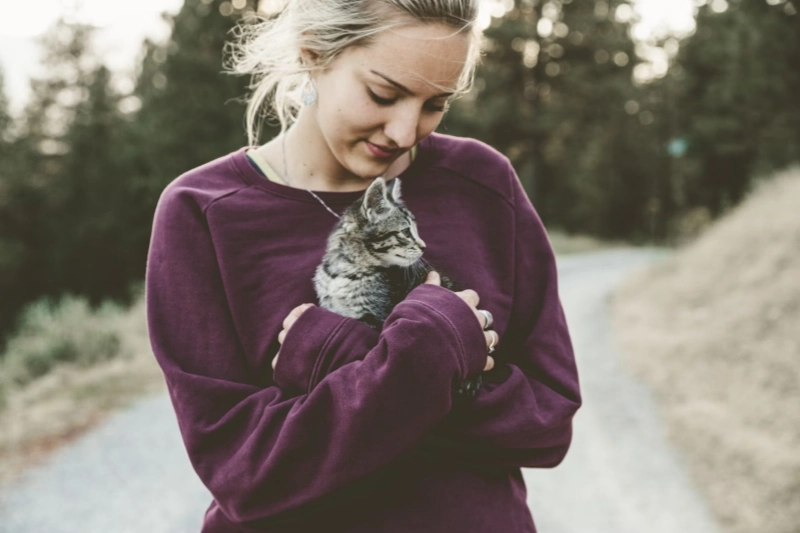Detection of Feline Panleucopenia Virus usually involves a series of laboratory tests. These tests may be recommended by your veterinarian to confirm the diagnosis when your cat shows signs of suspected feline distemper.
The most common test is to collect a blood sample from the cat and then test for viral DNA using polymerase chain reaction (PCR), a very sensitive technique that can accurately and quickly detect the presence of the virus.
In addition, the veterinarian may perform a routine blood test to look for an abnormally low white blood cell count, as the feline distemper virus attacks the cat’s white blood cells. Although routine blood tests cannot directly detect the virus, they can be used as one of the secondary diagnostic tools.

Sometimes, the veterinarian may also collect a stool sample from the cat for viral antigen testing. This method can detect the presence of the virus in the intestines, but it is important to note that the presence of the virus in the intestines does not necessarily mean that the cat is developing the disease.
If a cat is diagnosed with Feline Panleucopenia Virus, the veterinarian will develop a treatment plan based on the symptoms and severity of the condition. This usually includes measures such as providing supportive care, rehydrating fluids, and controlling secondary infections.
If your cat is showing symptoms of feline distemper, take it to your veterinarian promptly for diagnosis and treatment. Your veterinarian will provide you with professional advice and assistance depending on the circumstances. So we should know more about Feline Panleucopenia.
1. What is Feline Panleucopenia Virus(fpv)?
Feline Panleucopenia Virus, also known as feline leukemia virus, is a highly contagious virus that primarily infects felines. The virus belongs to the family of Felineoviridae and is the main pathogen that causes feline feline leukemia infections.
2. the symptoms of Feline Panleucopenia Virus
Cats infected with Feline Panleucopenia Virus may show the following symptoms: loss of appetite, vomiting, diarrhea, high fever and depression. After infection, the virus will affect the cat’s bone marrow to produce white blood cells, resulting in its body not being able to effectively fight against other diseases and being susceptible to other infections.
3. Mode of transmission
Feline Panleucopenia Virus is mainly transmitted through direct contact with the secretions and excretions of infected cats, such as feces, urine and saliva. The virus can also be transmitted through contaminated food and water.
4.Preventive Measures
Vaccination: Vaccinating cats against Feline Panleucopenia Virus is the most effective way to prevent infection. The first vaccination should be given when the kitten is 8-10 weeks old, and then a booster vaccination should be given at regular intervals.
Maintain hygiene: Clean up the cat’s feces and urine regularly, use bleach or pet-specific cleaners to clean the litter and eating utensils, and change the cat litter regularly. Keep the indoor environment clean and avoid cats touching food and water sources that may be contaminated.
Isolate infected cats: If you find a cat infected with Feline Panleucopenia Virus, isolate it immediately and seek veterinary help. At the same time, make sure other cats are properly protected.
Avoid contact with wild animals: Wild animals may be carriers of Feline Panleucopenia Virus, so cats should be avoided from contacting wild animals or stray cats.
Regular checkups: Take your cat to the veterinarian for regular checkups to ensure its health condition is good. The veterinarian can detect whether the cat is infected with Feline Panleucopenia Virus or other diseases.
5. Treatment
If your cat is infected with Feline Panleucopenia Virus, seek veterinary help immediately. Your veterinarian will develop a treatment plan based on the condition, which may include fluid therapy, antibiotic treatment and nursing care. While there are no specific medications that can completely cure the disease, early treatment can help alleviate symptoms and improve your cat’s health.
About Antigenne
Antigenne, holding the banner of enjoying living together with animals and protecting the health both of animals and humans, is dedicated to building a harmonious society for humans and animals. Insisting on the values of innovation, honesty and integrity, sticking to the principle of “quality is the cornerstone of future existence.” through innovative products and dimensional services, Antigenne is looking forward to cooperating with you and expecting to create a bright future with a win-win result.
Together, we can make a difference. Contact Antigenne now and let’s unlock the future of animal health.


